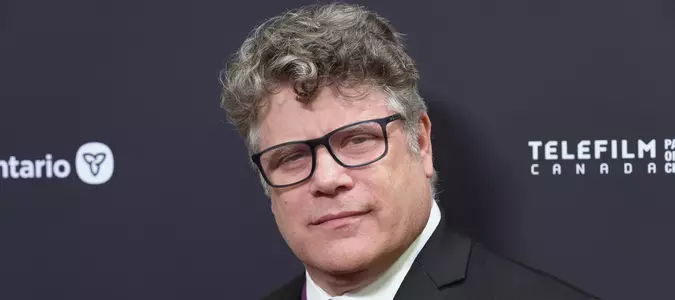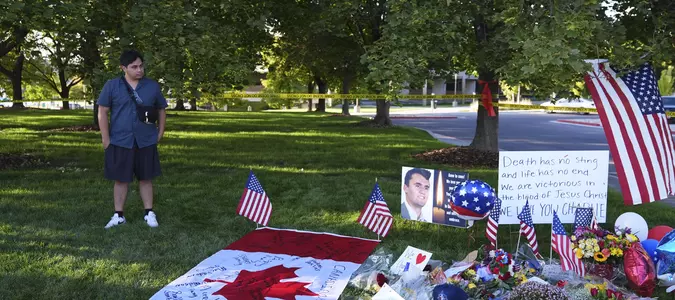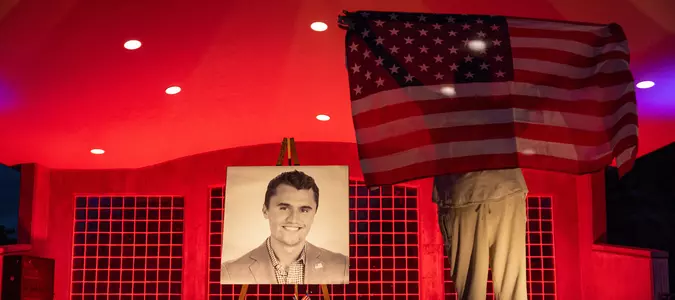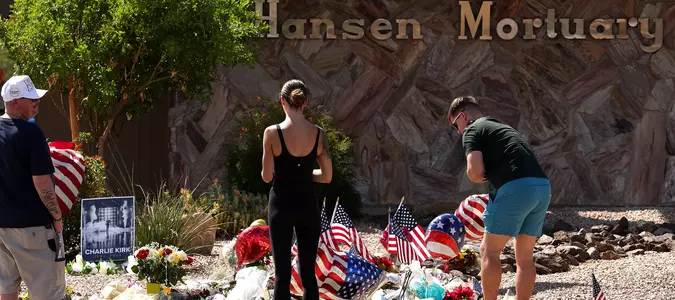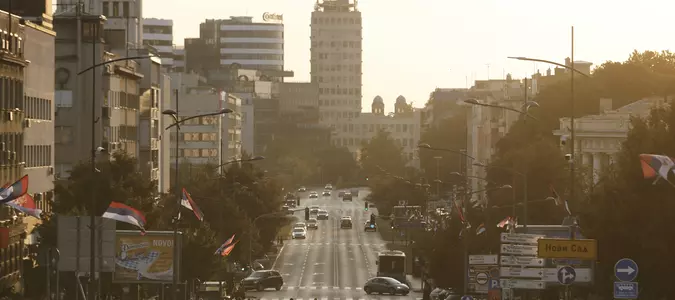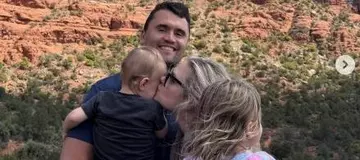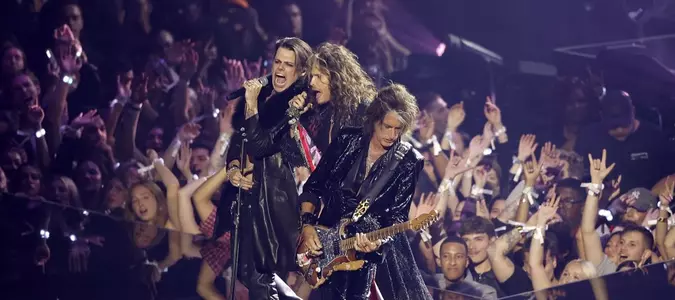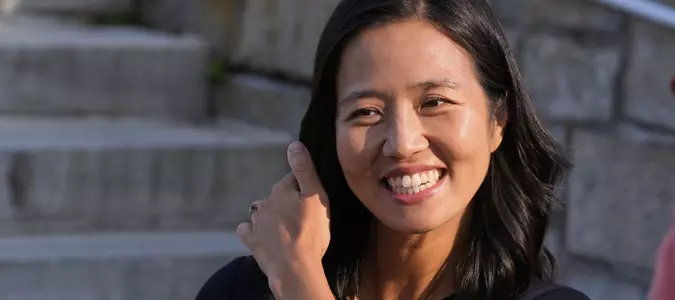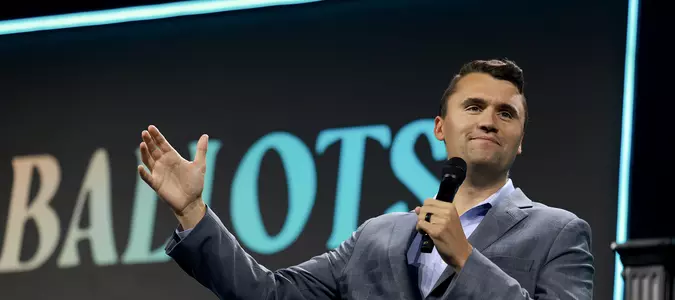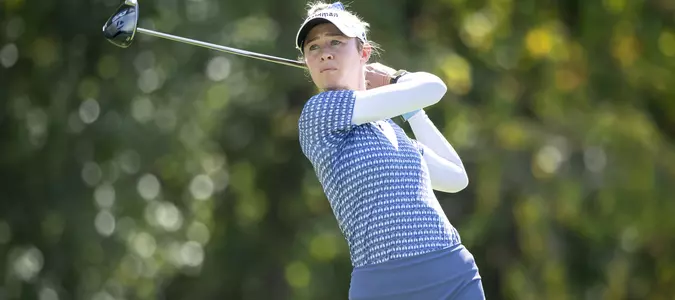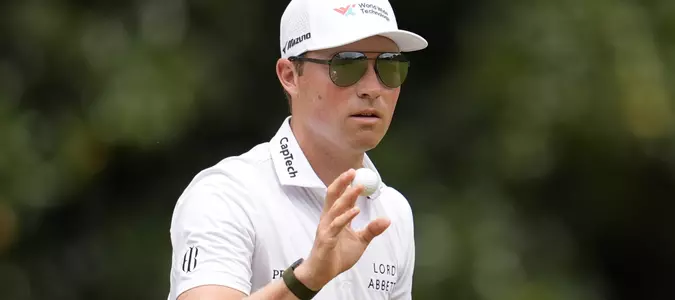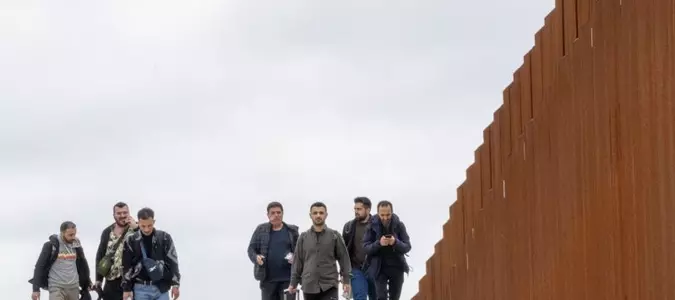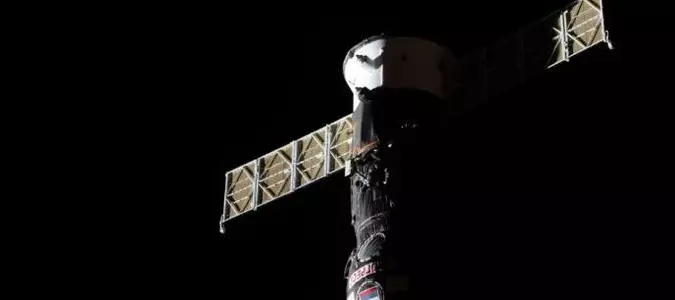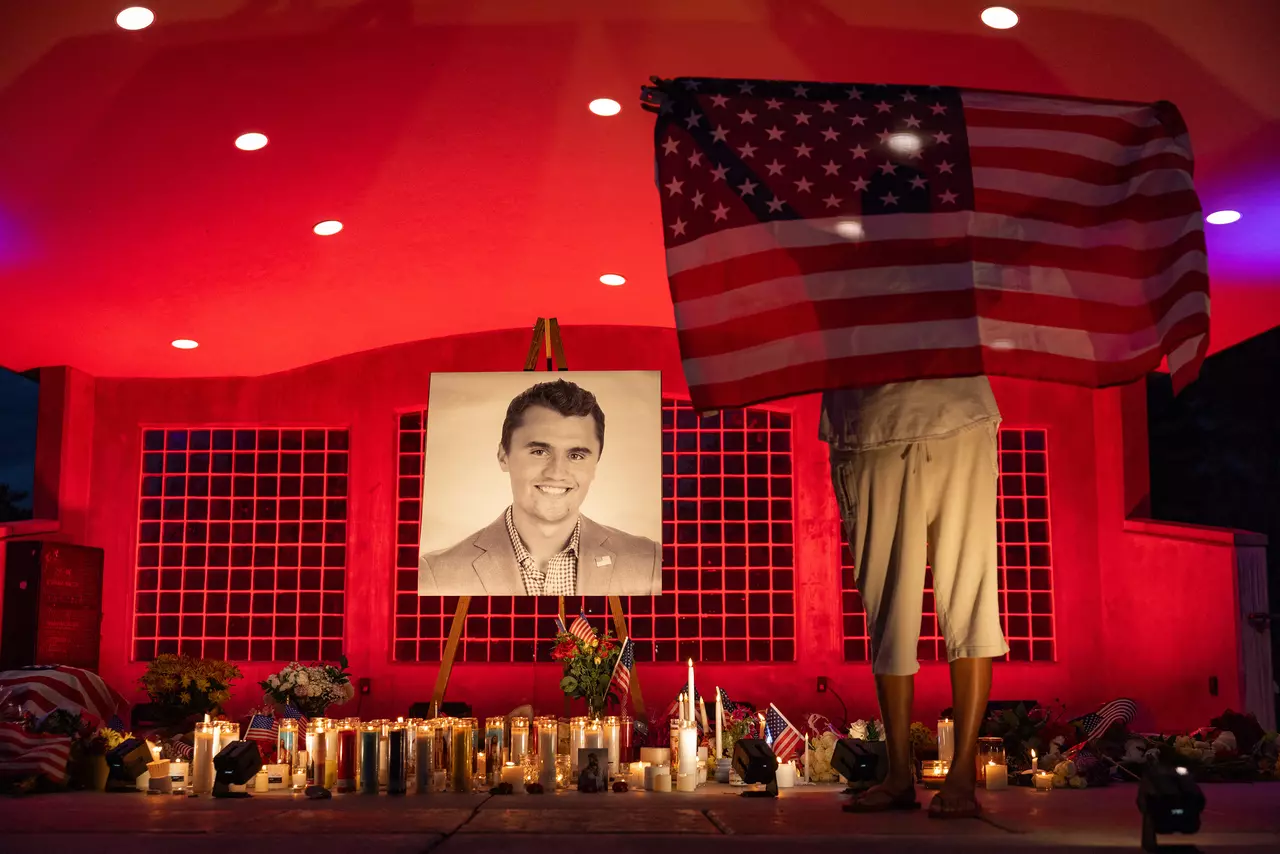

Charlie Kirk was killed in their town. Residents refuse to be consumed by hate
OREM, Utah — As dusk settled Thursday evening, people bowed their heads in prayer at a city park, struggling to comprehend all that had played out over the last 36 hours. They had been planning to mark the 24th anniversary of 9/11, covering public lawns with mini U.S. flags and "Never Forget" signs. Streets were lined with large displays of Old Glory. Instead, this conservative, religious city ...

People pay their respects during a candlelight vigil for youth activist and influencer Charlie Kirk at a makeshift memorial at Orem City Center Park in Orem, Utah, on Thursday, Sept. 11, 2025.
Melissa Majchrzak/AFP/Getty Images North America/TNS
OREM, Utah — As dusk settled Thursday evening, people bowed their heads in prayer at a city park, struggling to comprehend all that had played out over the last 36 hours.
They had been planning to mark the 24th anniversary of 9/11, covering public lawns with mini U.S. flags and "Never Forget" signs. Streets were lined with large displays of Old Glory.
Instead, this conservative, religious city was thrust into a national reckoning of political violence, forced into mourning after a gunman killed Charlie Kirk, an influential right-wing activist, as he was speaking at the local university.
How could an assassination happen in a place where the official motto is "Family City USA"? Where people make a point to lend a hand to strangers and where the Church of Jesus Christ of Latter-day Saints has more places of worship than the city has interstate exits?
"This act stands in direct opposition to our values of family, unity, respect and faith," Mayor David Young said to the massive crowd gathered for a vigil in honor of Kirk, an influential figure in American politics, whom many credit with energizing young conservatives and helping push President Donald Trump to reelection.
Kirk was known for challenging left-wing orthodoxies on college campuses and trumpeting his Christian faith. His beliefs also swung toward extremism, as he often spouted vitriol against racial and religious minorities, LGBTQ+ people, childless women, progressives and others who disagreed with him.
But at the vigil, people celebrated what they called his dedication to freedom of speech. As they held up candles and cellphone lights, Young reminded them that "darkness never has the last word."
Families huddled together. A young dad teared up, his baby strapped on his chest. Teenagers removed their "Make America Great Again" hats to pray. At one point, the crowd broke into chants of "U.S.A! U.S.A.!" and later erupted in applause after a call to stand up in the fight of good versus evil.
"It feels like the earth kind of shook," said Ashleigh Joe, 24, who moved to Orem two years ago from New Mexico.
Like many in the crowd and the city, Joe described herself as a Republican and a Kirk fan. Despite her worries that the shooter was still at large, she joined hundreds of others at the vigil, with many waiting in line to leave an offering — flowers, flags, candles, signs — on a makeshift altar featuring a large photo of Kirk.
"I feel like all we need right now is just God and the community to be together," Joe said.
The next morning, officials announced that they had arrested a 22-year-old Utahan in Kirk's killing, with the motive as yet unclear. The suspect didn't appear to have any ties to Orem; he lived in a small city in Utah's southwest corner, more than three hours away, where he was arrested.
Young, the mayor, said it's been difficult to see Orem's name flash across breaking news headlines, but he's trying to remind residents that they will rise past this.
"It's really painful, because it's just not who we are. Not even close," Young said. "It's just a super safe place, and people are friendly and kind and neighborly."
About 40 miles south of Salt Lake City, Orem sits in the shadow of towering mountains to the east and Utah Lake to the west. Though it boasts a little fewer than 100,000 people, it's the state's fifth largest city.
The metropolitan region of Happy Valley — which includes Orem as well as Provo, home of Brigham Young University — is often listed at the top of several national rankings: most religious, best-performing economically. Utah County, which includes Happy Valley, is about 70% Latter-day Saints, commonly known as Mormons, and 70% white, according to the latest figures.
To many who live here, Orem feels like a small town — and they're proud to call it home, with one man sharing at the vigil that his children are "fifth-generation Oremites."
...
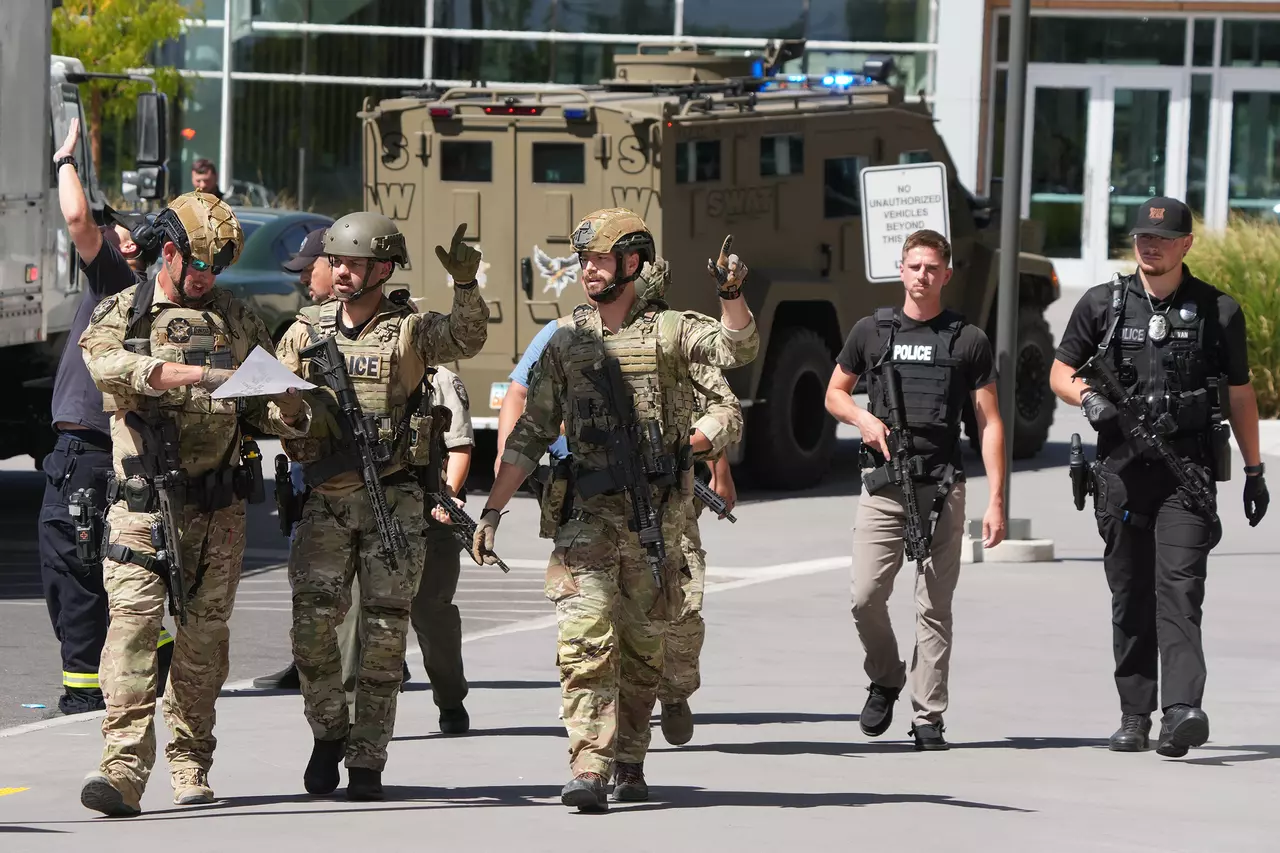
Law enforcement responds to the scene where political activist Charlie Kirk was shot during an event at Utah Valley University on Sept. 10, 2025, in Orem, Utah.
George Frey/Getty Images North America/TNS
On Thursday, as federal agents canvassed a neighborhood near Utah Valley University, where Kirk was speaking when he was hit in the neck with a single bullet, some residents offered them water. Others connected them with neighbors who weren't at home. Many shook the men's hands.
At memorials to Kirk around the city, a majority of those who spoke to The Times said they were fans of his. Even those who weren't said they were shaken by the shooting.
Loren Cain, who was born and raised in Orem and studied at Utah Valley University, said the world feels off kilter.
"It's just complete disbelief," said Cain, 48, who works in forensics and had come to appreciate Kirk and his style of debating political issues. "I woke up, and I just felt gross. I almost felt like I did something wrong."
Cain, who left a dozen roses at his alma mater, worries that his hometown will be forever known as the place where Kirk was assassinated.
"The killing just really hit me hard. Is that really where we're headed? What we've become?" he said.
Evelyn Frandsen, who also attended the university, said it was sickening that this happened in her community, at her school — but also surprising, given that many here generally agree with Kirk's views. Others who spoke to The Times also said that Orem and Utah were among the last places they would expect Kirk to be targeted.
"He should have been protected here," said Frandsen, 24, at a small memorial outside the hospital where Kirk died.
But David Frame, who moved to Orem seven years ago to teach at the university, said local residents shouldn't be surprised that it happened here, given Utah's staunchly pro-gun attitudes and policies.
"It's shocking to find someone who's not toting a gun," said Frame, 61, who teaches mechatronics — a mix of mechanical engineering, electrical engineering and computer science.
As non-Mormons who lean politically left, Frame and his wife weren't sure what to expect when they arrived in Orem. Almost immediately, though, they felt enveloped by the kindness of the community.
"It was surprisingly accepting," Frame said. "I have never been in a place where so many people jumped up to help in so many ways."
On Thursday, many people driving by the Kirk memorials honked in support. But one person rolled down their window and yelled: "He deserved everything he got!"
People paying their respects at the memorial were taken aback, with one commenting that, even in Utah, "there are some psychopaths."
At the evening vigil at the park, Klea Harris worried about demonizing people at opposite ends of the political spectrum.
Harris, 48, who considers her family "politically mixed," hopes that people lean on their faith as they try to move forward from this tragedy, rather than veering toward extremism.
"We can't make it an us versus them," the mother of eight said.
